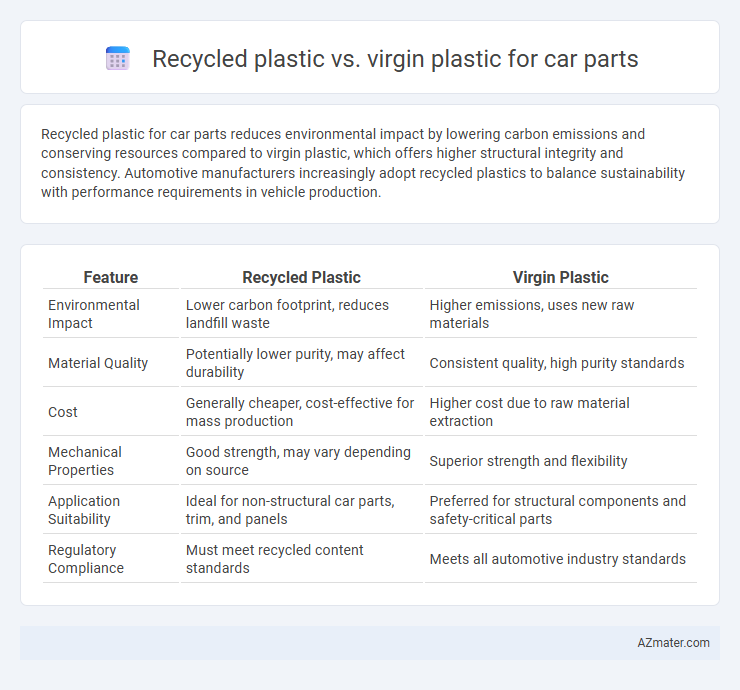Recycled plastic for car parts reduces environmental impact by lowering carbon emissions and conserving resources compared to virgin plastic, which offers higher structural integrity and consistency. Automotive manufacturers increasingly adopt recycled plastics to balance sustainability with performance requirements in vehicle production.
Table of Comparison
| Feature | Recycled Plastic | Virgin Plastic |
|---|---|---|
| Environmental Impact | Lower carbon footprint, reduces landfill waste | Higher emissions, uses new raw materials |
| Material Quality | Potentially lower purity, may affect durability | Consistent quality, high purity standards |
| Cost | Generally cheaper, cost-effective for mass production | Higher cost due to raw material extraction |
| Mechanical Properties | Good strength, may vary depending on source | Superior strength and flexibility |
| Application Suitability | Ideal for non-structural car parts, trim, and panels | Preferred for structural components and safety-critical parts |
| Regulatory Compliance | Must meet recycled content standards | Meets all automotive industry standards |
Introduction to Plastic Usage in Automotive Industry
The automotive industry extensively uses plastic materials for components such as bumpers, dashboards, and interior trims due to their lightweight and durability. Recycled plastic offers a sustainable alternative by reducing environmental impact without significantly compromising performance compared to virgin plastic. Advancements in recycling technologies have enhanced the quality and consistency of recycled plastic, making it increasingly viable for automotive manufacturing.
What is Virgin Plastic?
Virgin plastic refers to new, unprocessed plastic material produced directly from petrochemical raw materials without any prior usage or recycling. It offers consistent quality, strength, and durability, making it ideal for manufacturing critical car parts that require high performance and reliability. Compared to recycled plastic, virgin plastic provides superior purity and mechanical properties essential for automotive safety and longevity.
What is Recycled Plastic?
Recycled plastic for car parts is produced by processing used plastic waste, such as packaging and automotive scrap, into new, reusable material that meets automotive industry standards. This eco-friendly alternative reduces reliance on virgin plastic, which is derived from petroleum-based raw materials, and significantly lowers carbon emissions during production. Employing recycled plastic improves sustainability in vehicle manufacturing by conserving resources and minimizing environmental impact without compromising part durability or performance.
Environmental Impact: Virgin vs Recycled Plastic
Recycled plastic significantly reduces environmental impact compared to virgin plastic by lowering greenhouse gas emissions and conserving natural resources such as petroleum. Using recycled plastic in car parts decreases landfill waste and energy consumption by up to 60% during production processes. Virgin plastic production involves higher carbon footprints and greater resource depletion, making recycled alternatives critical for sustainable automotive manufacturing.
Manufacturing Processes Compared
Recycled plastic in car part manufacturing involves mechanical or chemical recycling processes that convert post-consumer waste into usable pellets, reducing raw material extraction and energy consumption compared to virgin plastic production. Virgin plastic manufacturing requires polymerization of petrochemical feedstocks, which demands higher energy input and generates more greenhouse gas emissions throughout the production cycle. Advances in injection molding and extrusion technologies enable recycled plastics to meet automotive standards, although virgin plastics typically provide superior consistency and mechanical properties for critical components.
Cost Analysis: Recycled vs Virgin Plastic
Recycled plastic car parts typically reduce material costs by 20-40% compared to virgin plastics due to lower raw material prices and decreased energy consumption during production. Virgin plastics, while pricier upfront, offer consistent material properties that can reduce defects and long-term maintenance costs. Balancing cost efficiency with performance requirements is essential for manufacturers when choosing between recycled and virgin plastic components.
Performance and Durability in Car Parts
Recycled plastic in car parts often shows comparable performance and durability to virgin plastic when properly processed, maintaining strength, heat resistance, and impact tolerance essential for automotive applications. Advances in recycling technologies ensure recycled plastics meet stringent automotive industry standards, contributing to lightweight design and fuel efficiency without compromising safety or longevity. However, virgin plastics still offer superior consistency and fewer impurities, making them preferable for critical components requiring maximum reliability under extreme conditions.
Regulatory Compliance and Industry Standards
Recycled plastic used in car parts must meet stringent regulatory compliance and industry standards such as ISO 14001 for environmental management and the Automotive Industry Action Group (AIAG) quality protocols. Virgin plastic often provides more consistent compliance with safety and performance standards like ASTM D7611, but advancements in recycled plastic technologies are closing this gap by enhancing material properties and traceability. Manufacturers leveraging recycled plastics demonstrate commitment to sustainability while adhering to regulations like REACH and RoHS, ensuring safe use in automotive applications.
Challenges and Limitations of Recycled Plastics
Recycled plastics used in car parts face challenges such as inconsistent material quality and potential contamination, which can compromise structural integrity and safety standards. Limited availability of high-grade recycled polymers restricts their application in critical components that demand precise mechanical properties and durability. Furthermore, difficulties in processing and compatibility with existing manufacturing techniques often increase production costs and complicate large-scale implementation.
Future Trends in Automotive Plastic Usage
The future of automotive plastic usage increasingly favors recycled plastic due to stringent environmental regulations and growing consumer demand for sustainable vehicles. Advances in polymer reclamation technology enhance the quality and durability of recycled plastics, making them viable alternatives to virgin plastics for car parts like dashboards, bumpers, and interior panels. Automakers are investing in circular economy practices, incorporating higher percentages of recycled content to reduce carbon emissions and support eco-friendly manufacturing processes.

Infographic: Recycled plastic vs Virgin plastic for Car part
 azmater.com
azmater.com